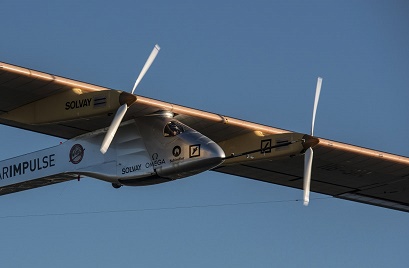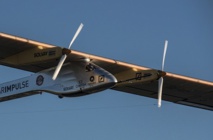World’s first unique solar-powered aircraft soars to its journey across the globe without a single drop of fuel. The plane took off from Abu Dhabi on 9th March 2015 headed towards Muscat, Oman’s capital. The relatively short distance of around 400 Km is the first leg of its plan for 12-stop circumnavigation around the world over a span of 5 months. The longest part of the trip involves 5-day trip across the Pacific and Atlantic Oceans. That will be a big test of the plane’s technology which gets power from solar cells and stores within its batteries in order to fly overnight.
It is expected to fly to Ahmedabad crossing Arabian Sea before its journey to Myanmar, China, Hawaii and New York. Besides, the schedules also include its trip to the mid-western US and southern Europe or North Africa, which will be highly dependent upon weather conditions.
“Solar Impulse 2”, a zero fuel plane is seen as a cleantech revolution. The mission leg of the aircraft is hosted by many partners including Solvay, ABB, Schindler, Gujarat government, GERMI and GEDA, Bayer, Google, Swiss Re Corporate Solutions and Swisscom. During the halts, the Solar Impulse team along with its host partners will spread knowledge about importance of renewable energy, with the help of public events for governments, schools and universities. Founder and CEO of Solar Impulse 2, Andre Borschberg was at the controls during the first trip of the plane. Later, Borschberg allowed Bertrand Piccard to take charge in the next leg. Both the Swiss pilots Andre Borschberg and Bertrand Piccard will take turns to fly the single seated plane.
Almost one century after the historic flight by Wright Brothers, the announcement of this project was made on November 2003. The aircraft is powered by about 17,000 solar cells within its wings which are 72-meter long, much longer than even Boeing 747. The plane includes 17.5 horsepower motors with 4 lithium polymer batteries weighing 633 kg each that provides support to the plane to fly at night. With the help of its long wings, the plane can fly at the altitude of 8,500 metres at a speed of about 50-100 km per hour.
The innovative and amazing design makes the carbon fibre aircraft very light weighted with only 2.3 tons of weight, similar to a four wheeler car and even less than 1% of the weight of Airbus A380. The major challenge faced in the series of flight, is likely to be the shifting of aircraft support crew members to different locations.
The main objective of this project was to promote green energy and demonstrated that new technology can reduce dependency on fossil fuels and help to protect environment. With the world gearing up to take measures to fight against global warming, there is an increased requirement of renewable energy and clean technology. At the time of rising awareness to save climate, the launch of Solar Impulse has provided a wave of motivation across the world to save energy.
It is expected to fly to Ahmedabad crossing Arabian Sea before its journey to Myanmar, China, Hawaii and New York. Besides, the schedules also include its trip to the mid-western US and southern Europe or North Africa, which will be highly dependent upon weather conditions.
“Solar Impulse 2”, a zero fuel plane is seen as a cleantech revolution. The mission leg of the aircraft is hosted by many partners including Solvay, ABB, Schindler, Gujarat government, GERMI and GEDA, Bayer, Google, Swiss Re Corporate Solutions and Swisscom. During the halts, the Solar Impulse team along with its host partners will spread knowledge about importance of renewable energy, with the help of public events for governments, schools and universities. Founder and CEO of Solar Impulse 2, Andre Borschberg was at the controls during the first trip of the plane. Later, Borschberg allowed Bertrand Piccard to take charge in the next leg. Both the Swiss pilots Andre Borschberg and Bertrand Piccard will take turns to fly the single seated plane.
Almost one century after the historic flight by Wright Brothers, the announcement of this project was made on November 2003. The aircraft is powered by about 17,000 solar cells within its wings which are 72-meter long, much longer than even Boeing 747. The plane includes 17.5 horsepower motors with 4 lithium polymer batteries weighing 633 kg each that provides support to the plane to fly at night. With the help of its long wings, the plane can fly at the altitude of 8,500 metres at a speed of about 50-100 km per hour.
The innovative and amazing design makes the carbon fibre aircraft very light weighted with only 2.3 tons of weight, similar to a four wheeler car and even less than 1% of the weight of Airbus A380. The major challenge faced in the series of flight, is likely to be the shifting of aircraft support crew members to different locations.
The main objective of this project was to promote green energy and demonstrated that new technology can reduce dependency on fossil fuels and help to protect environment. With the world gearing up to take measures to fight against global warming, there is an increased requirement of renewable energy and clean technology. At the time of rising awareness to save climate, the launch of Solar Impulse has provided a wave of motivation across the world to save energy.



















